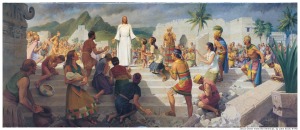 The story is told of Sharru Nada, a slave. In his concern over being forced to work on the walls of the city, a hard and grueling task, he consults with another slave, Megiddo, who tells him the secret to being a successful slave:
The story is told of Sharru Nada, a slave. In his concern over being forced to work on the walls of the city, a hard and grueling task, he consults with another slave, Megiddo, who tells him the secret to being a successful slave:
When no buyers were near, he talked to me earnestly to impress upon me how valuable work would be to me in the future: “Some men hate it. They make it their enemy. Better to treat it like a friend, make thyself like it. Don’t mind because it is hard. If thou thinkest about what a good house thou build, then who cares if the beams are heavy and it is far from the well to carry the water for the plaster. Promise me, boy, if thou get a master, work for him as hard as thou canst. If he does not appreciate all thou do, never mind. Remember, work, well-done, does good to the man who does it. It makes him a better man.”
Sharru Nada heeds this advice and becomes very successful, first as a slave and then eventually as a free man. (see “The Richest Man in Babylon” by George S. Clason).
When Adam was cast out of the Garden of Eden, he also learned this important lesson: “And unto Adam, I, the Lord God, said…cursed shall be the ground for thy sake…By the sweat of thy face shalt thou eat bread…” (Moses 4:23&25)
Heavenly Father knows how important it is for us to work. In this scripture, Adam was told that the ground would be cursed for his sake. One interpretation of this is that Adam would be required to work in order to eat–and that this work would be good for Adam (“for thy sake” being interpreted as being “for thy good”).
How many people do you know that dislike work? How many people have you associated with who believe they just have to do enough to not get fired or who let others do the work and avoid as much as possible? How far do these people usually go?
I believe that one of the keys to an abundant life–and truly one of the best things in life–is to learn to work hard. I learned this lesson as a missionary in Brazil. As missionaries, we set our own schedule, we decide who we are going to teach, and we determine our own work load. The missionaries who were most successful were the ones who were teaching more and had busy schedules. I had one companion who did not like to work hard. He made sure we had ample time in between appointments “so as to not be late” and he was particularly fond of taking a nap after lunch. We also had a part-member family that just needed to get some legal things cleared up before they could get baptized. My companion loved to stop by every night because they always had cookies for us–we rarely taught them anything but he could always justify it (at least to himself) because the wife was technically an investigator. Lets just say that our companionship wasn’t the best and that we didn’t find a whole lot of success in our labors. On the contrary, I was transferred into one area where I had a junior companion who loved to work. We were out and running as soon as we could in the morning and we worked all day long–and sometimes even on our preparation day. I didn’t last long in that area before I was transferred out; however, that was my most successful area and one of my fondest memories as a missionary. This lesson served me well later in school and currently in my employment.
Our Savior taught of the value of work as well when He was on the Earth for He said, “My Father worketh hitherto, and I work” (John 5:17). He also commanded us “Thou shalt not be idle; for he that is idle shall not eat the bread nor wear the garment of the laborer.” (D&C 42:42) and again He said, “Now, I, the Lord, am not well pleased with the inhabitants of Zion, for there are idlers among them” (D&C 68:31).
Truly work is a blessing–and we should view it as such. Indeed, work is one of the principles whereupon successful families are established and maintained (see The Family: A Proclamation to the World). I love work and I know that it is important for our present life as well as our life in the eternities.
So what are your thoughts about work? How do we make it less of a drudgery and more of a blessing?

